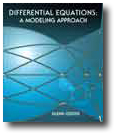 |  Differential Equations: A Modeling Approach Glenn Ledder,
University of Nebraska - Lincoln
Feature SummaryFeature Flexible Organization (including optional topics)
Benefit: Allow customization of course content and structure
Feature Case Studies (optional)
Benefit: Strengthen students' mathematical modeling skills through the in-depth exploration of a real-world modeling problem
Feature Model Problems
Benefit: Motivate the mathematics in each section by focusing attention on an example that illustrates the key methods or theories presented
Feature Wide Variety of Examples
Benefit: Engage students' interest and build connections with previous and subsequent material
Feature Instant Exercises
Benefit: Enable students to quickly check that they understand what they have just learned (often by working a problem that mimics an example) before proceeding to new material
Feature Balanced Exercise Sets
Benefit: Allow students to test their skills and understanding by solving a range of routine to challenging problems (some are appropriate for group or lab work)
Feature Technology Usage
Benefit: Provide practice in using graphing calculators and computer algebra systems for problem solving
|
|



 2005 McGraw-Hill Higher Education
2005 McGraw-Hill Higher Education

 2005 McGraw-Hill Higher Education
2005 McGraw-Hill Higher Education